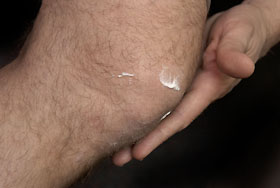For more archives, go to the Advance Archive/Search Page.
New Cream To Treat Arthritis
Proves Effective, Says Researcher
A promising new treatment is in the works for millions of people suffering from osteoarthritis, thanks to research conducted at the Neag School of Education's Human Performance Laboratory.
 |
|
William Kraemer, a professor of kinesiology, has
studied the efficacy of a topical treatment for arthritis symptoms . Photo by Peter Morenus
|
The study, led by William Kraemer, an endocrinologist and neuromuscular physiologist, tested the effectiveness of an experimental topical cream on the functional performance and quality of life in patients with osteoarthritis.
An estimated 21 million people in the United States are afflicted with the condition, which can involve any joint. However, this investigation focused entirely on the joint most commonly affected: the knee.
A bioceutics manufacturer in California, which funded a portion of the research, created the cream containing a customized blend of fatty acids referred to as cetylated fatty acids. According to Kraemer, previous research on an ingested form of the compound showed improved function and pain relief, but this was the first investigation into its topical applications.
All the study subjects who applied the cream to the affected joint reported a significant reduction in pain and stiffness and an improvement in range of motion.
"We were surprised that the cream worked so well," says Kraemer, a professor in the kinesiology department who holds joint appointments in the Department of Physiology and Neurobiology and the School of Medicine. "Just 30 minutes after the patients applied the cream, they experienced an effect."
Kraemer believes more research is needed to find out how and why the product was so effective. "These results are just the tip of the iceberg," he says.
Forty patients around the age of 60, who were diagnosed with osteoarthritis in one or both knees, were randomly assigned to one of two groups. The researchers measured their pain, stiffness, and range of motion. They timed how long it took the patient to get up from a chair and climb a set of stairs.
 For one month, one group applied a standardized amount of placebo
cream twice a day to the knee joint, while the other group applied the experimental
cream. The patients were not allowed to take any additional arthritis medications
or treatments during the study, and their diets were closely monitored to ensure
the results were not affected by a weight gain or loss.
For one month, one group applied a standardized amount of placebo
cream twice a day to the knee joint, while the other group applied the experimental
cream. The patients were not allowed to take any additional arthritis medications
or treatments during the study, and their diets were closely monitored to ensure
the results were not affected by a weight gain or loss.
"The study took a real team effort," says Kraemer. His colleagues included: Carl Maresh, head of the kinesiology department; Dr. Jeffrey Anderson, director of sports medicine; David Tiberio, associate professor of allied health; and several other colleagues from the lab and the UConn School of Medicine who helped identify potential test subjects.
Details of the study, "Effect of a Cetylated Fatty Acid Topical Cream on Functional Mobility and Quality of Life of Patients with Osteoarthritis," were published in the April edition of the Journal of Rheumatology.

